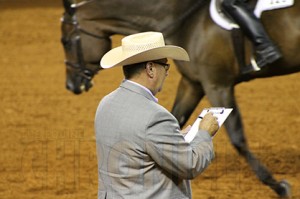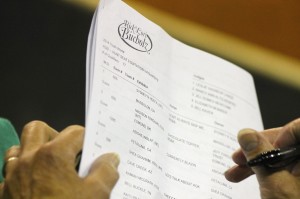Is Facebook a Judge’s Worst Enemy?
NOTE: This article was originally written for a livestock audience, however, we feel many of the points outlined below certainly apply to horse show judging as well. Many thanks to Rachel Cutrer for allowing EquineChronicle.com permission to reprint this timely and insightful piece.
By: Rachel Cutrer, CEO of Ranch House Designs
There is no denying that Facebook is the most powerful social media tool with numerous social benefits for connecting friends and sharing news and information. But, when it comes to judges and exhibitors interacting with each other on Facebook, there is a fine line of what is acceptable and what is unethical….begging the question: Is Facebook a livestock judge’s worst enemy?
Judge Bashing/Bullying
Once upon a time, at a large prospect show in Texas, an angry show mom threw her red solo cup on a judge from outside the ring because she was so mad at the way her cattle placed. That instance was known throughout Texas as “the worst butt chewing” any judge ever got. The legend still lives today amongst old school Texas prospect show exhibitors. Today, judges open themselves up for a lot more public criticism, especially now that it is so easy to fire off a status on social media outlets in a split second. Now of course, I understand free speech, and that everyone is entitled to give their thoughts, but it is my personal opinion that Facebook isn’t the place for judge bashing.
I read my first judge bashing post on social media three years ago, and since then, it seems this has become more of a popular practice. The scenario usually goes like this: Someone gets mad because they didn’t like the way their calves placed. They post a status saying how bad the judge was, and then their friends start liking the post. Outsiders who weren’t at the show start commenting to ask what happened, and before you know it there are 73 comments in the post.
By this time, chances are the judge being bashed has been alerted about the post. Even if he isn’t on Facebook, he’ll find a way to read the post, or his wife will read the post. Heck, maybe even his 82-year-old grandma who’s now on Facebook will read the post, and probably worst of all, his kids will read the post. Regardless of whether he did a good or bad job, that’s a lot of people (including children) who’ve been publically embarrassed. Makes getting beer thrown on you from across the makeup ring sound not so bad after all, huh?
Friend Requesting Judges
In our recent livestock marketing survey, we asked the question “have you ever friend requested a judge you didn’t know prior to them judging you in a show?” 86% of the respondents said no; they would never do that. But from talking with lots of friends, who judge a lot of shows, trust me…it’s happening. Sure, if you have been real life friends with someone long before they judge a show, of course you’re going to be friends on Facebook. But, let’s think about it this way… an exhibitor or a parent would never just call up a judge the week before the show on his or her cell phone if he or she didn’t know the judge, would they? Let’s use the same rationale on Facebook. Judges aren’t stupid. They realize that if you instantly try to become their BFF on Facebook three months before they are slated to judge a major show, that you probably have ulterior motive.
Judges Scoping Out the Competition on Facebook
Here’s a definite no-no for judges, but let’s admit, if you’re scrolling through Facebook and already friends with a potential exhibitor (see above), it’s kind of hard NOT to see the pictures they post and know how they have been doing at the shows. That’s why I think it’s a good practice for judges to avoid Facebook, at least for a few weeks or so prior to judging a major show. To put it in a real life scenario, if a judge was judging at Fort Worth, there is no way they would sit in the stands at the Denver and write down the placing of every single class so they knew how certain cattle had been doing. The same goes for Facebook.
Tagging Judges On Facebook
What would happen if it was discovered that one of your fellow exhibitors was mailing pictures of his or her show cattle to the show judge with a note that said, “Check out my calves,” just a few weeks before the show? That would clearly be a violation of ethics. People would be mad. Perhaps a protest would be filed. But would you believe that there are individuals who post their calf pictures on Facebook and then tag the judges of the upcoming shows! Say it isn’t so! Oh yes, this is happening. Tagging judges in pictures before they judge a show is one of the most unethical practices of judge influencing that occurs on Facebook. Not only is it insulting to the judge, it also gives a poor reflection of the judge’s integrity to everyone else on Facebook when the public can see that the judge has been tagged in a potential exhibitor’s photo.
Should Judges Even Be On Facebook?
With all these problems occurring, should judges even be on Facebook? Well of course they can, as long as they do it responsibly and ethically. Now should they be Facebook stalking every single ranch Facebook page and friend requesting everyone they think might possibly show at their show? No.
Several of my friends are high-level judges, and when you analyze their Facebook behavior (which people like me do), you see that they keep their Facebook activity pretty low profile, especially prior to judging major shows. A judge’s online behavior usually mirrors their daily behavior. If someone is judging a major show, chances are you won’t see them just hanging out in the barns at other major shows within that time frame. The best judges hold their integrity in the highest regard, and they aren’t going to let Facebook – or any other activity – stand in the way of their good reputation. And, as exhibitors, we should respect a judge’s privacy on social media.
Should Judges Look At Facebook After They Judge a Show?
After a show, it has to be tempting to look on Facebook to see if anyone is discussing the show or discussing the judge on Facebook. After I judged the Shorthorn Junior National Showmanship, I got tagged in several photos from the show, and of course I went to look. Then, a quote from my former professor, Dr. Dave Hawkins of Michigan State, came to my mind. In past articles, he wrote about livestock judging. He said, ‘after a show, judges should feel satisfied, from within, at the job they did….don’t go back to the barns looking for compliments or seek out opinions from exhibitors.” This advice was given way before the days of social media, but it still holds true.
Remember, Judges are Human Too
There is a picture of a little league sign that has been circulated around the Internet that says:
Please Remember:
1) These are kids.
2) This is a game.
3) Coaches are volunteers
4) Umpires are Human
No matter where the show, or who the judge is, I feel like exhibitors should expect these 5 things:
- A judge who arrives on time and follows the show schedule
- A judge who is dressed professionally.
- A judge who gives each exhibitor a good look.
- A judge who is ethically fair.
- A judge who explains their placings clearly and effectively.
Notice I didn’t say “A Judge You Agree With” because that ain’t gonna happen for every single exhibitor and every single show. But if you have a judge that meets these criteria, then in my opinion, he or she has done his or her job.
When I was a junior showman, after every show, no matter how we placed, we had a rule that after the show was over we would shake the judge’s hand and thank him for the job he did that day. No matter how we placed. Yes, of course, there were times when we talked all the way home about how stupid we thought some judges were. Heck, we still have some inside jokes about judges we might have shown under 10 years ago. But the thing is, we kept any negativity within our own truck and our own family. Remember, we are all human – judges, parents, exhibitors, and breeders – and we all deserve respect.
About the Author
Rachel Cutrer is CEO of Ranch House Designs, an internationally acclaimed livestock advertising agency. She is also a Brahman cattle breeder and avid livestock show enthusiast.












